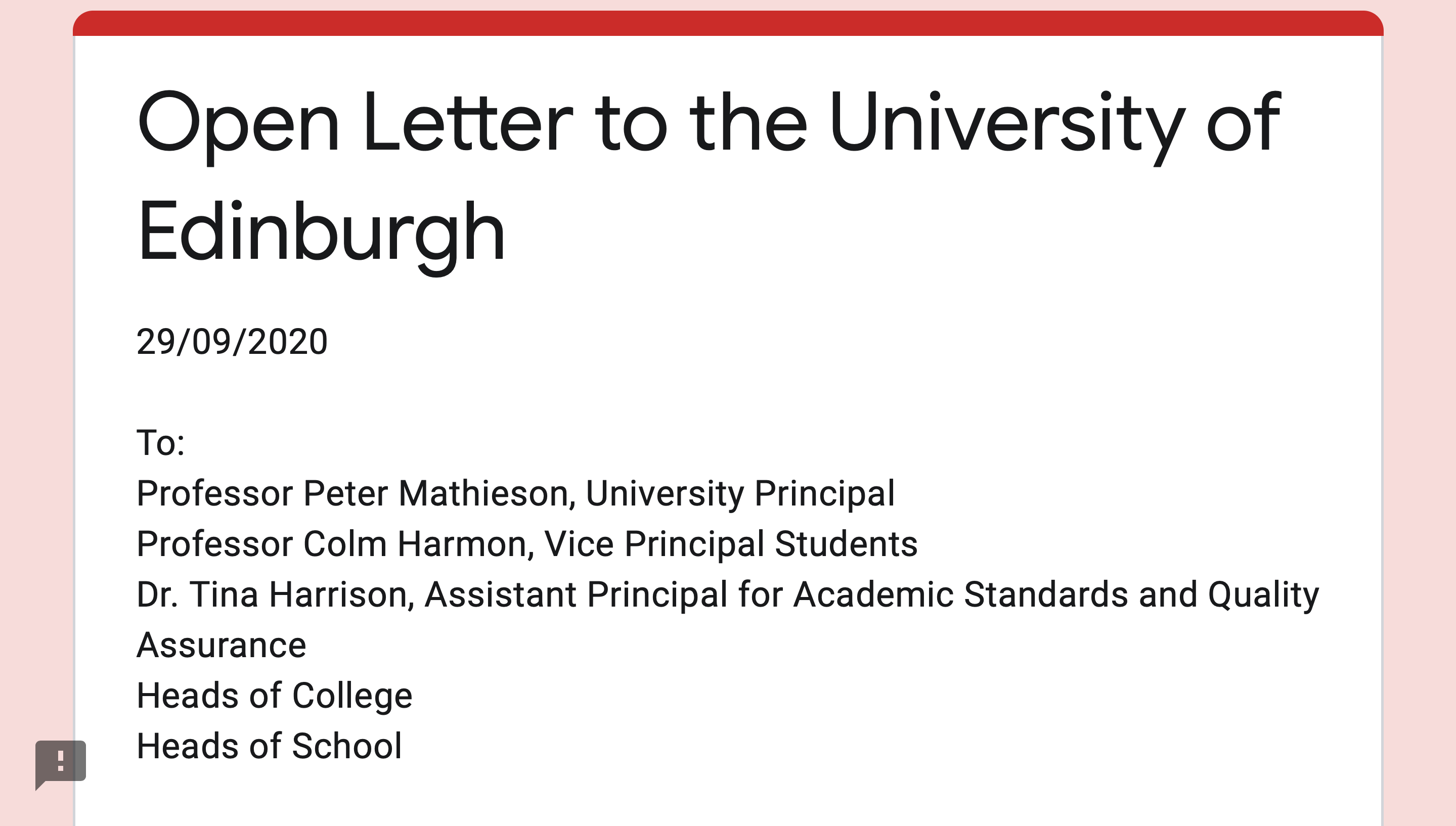“Dissatisfied.”
“Tired.”
“Need Consistency.”
These are all comments written on a University of Edinburgh Student Experience padlet wall created by Camilla, an MSc student. She arranged and co-wrote a recent open letter regarding the COVID-19 pandemic addressed to the University of Edinburgh.
A few weeks before, she had posted in a postgraduate Facebook group about her dissatisfaction with the way that the university is handling the COVID-19 pandemic, wondering if there was any way that she could express her concerns to the university itself.
“I feel that this situation is being managed very badly and that they are… selling this as the way things should be.”
After an outcry of similar sentiments from fellow students, she and a few other students got together to create an open letter to the university outlining their specific grievances and demands for better hybrid learning. The letter outlines six demands that they expected to the university to address:
- Partial reimbursement of tuition fees
- The same number of contact hours for online lectures as for in-person lectures
- A 30-day deadline extension for tuition fees
- On-site COVID-19 testing
- No more automated email replies
- Free higher-bandwidth internet access for all student and faculty staying in University accommodations
The letter, which was submitted to the university two weeks ago, was spread widely amongst the student body through Facebook, gaining 2,500 signatures as of Saturday 10 October. Camilla, who, with the help of ten to fifteen other students, drafted the letter, says that she believes that it was a good starting point, but one that has been tragically stalled by the university after the university published their response on 2 October.
The response, written by Colm Harmon, Vice Principal of Students, who was writing on behalf of senior university leadership, thanked the writers of the open letter for the “harsh but constructive criticism” of the university’s handling of the COVID-19 pandemic, and for the clear set of requests that the letter laid out. He then went on to defend the university’s handling of the pandemic, “We always recognised that this would be an unconventional academic year, but our focus has been to make it as effective as possible for you.”
In terms of the particular requests that the open letter laid out, Harmon agreed to take note of the request to extend the fee deadline for 30 days and to improve the quality of university responses to inquiries by email.
This was of particular concern for Camilla, who believed that she would have greatly benefited from better communication from the university and an extension of the fee deadline. When asked about the points in which the university conceded, Camilla said what many are thinking: “I will see it as a win when I see it happening.”
The university has also agreed to speak with Optify, the official university accommodation internet provider, but they believe that an increase in broadband “might actually destabilize the network in some Halls.”
As for the rest of the requests, the university was not so quick to agree. Harmon, for one, is adamant that the university will not reduce fees for the 2020/21 school year, “The cost of delivering our educational offering is no lower.”
This is particularly devastating for students paying £9000, and for international students paying upwards of £20,000, for an online school. One student, a postgraduate in the School of Social and Political Sciences, decided to drop out of their degree instead of facing heavy fees for entirely online learning,
“Why would I travel to Scotland with soaring COVID cases and mostly online classes? Also, could I justify paying £22,850 for this?”
Many expect that situations like this will become more and more common as the year goes on, with many students deciding to stall their university learning or even quit altogether and try to enter an increasingly unstable job market
As for the increasingly asynchronous online learning that many students are contending with, Harmon seems to have delegated the decision about what percentage of students’ learning would be asynchronous to the individual schools. “In shaping this model we did not, as some institutions have, insist on some minimum level of synchronous activity,” which has had a profound impact on students like Camilla.
According to Camilla, “Some students found themselves in situations… their departments did not make any kind of effort to engage them in the content.
She remarked that they did not even try “to create even a semblance of what a lecture should look like.”
She says she understands the need to comply with new regulations released from the Scottish government, but she believes that minimal effort in terms of student engagement and student-professor relationships has been put forth.
For the original drafters of the open letter, the university’s response has been less than overwhelming, especially the university’s refusal to open up on-site COVID testing as it is “frankly impracticable as a request and not in line with the most up-to-date public health advice.”
This is after many schools, including Cambridge, have committed to testing all of their students weekly.
This is incredibly frustrating to some students including the postgrad in the School of Political and Social Sciences who asked, “Is Edinburgh university students’ health less important?”
According to the drafters of the open letter, the university’s response is less than overwhelming, with many people just wanting transparency from the university about their decisions regarding the pandemic.
They were to meet Thursday 15 October to continue the discussion about university-student relations for the coming academic year and hopefully will come to a satisfactory conclusion.
Image: Ece Kucuk via Google Forms

